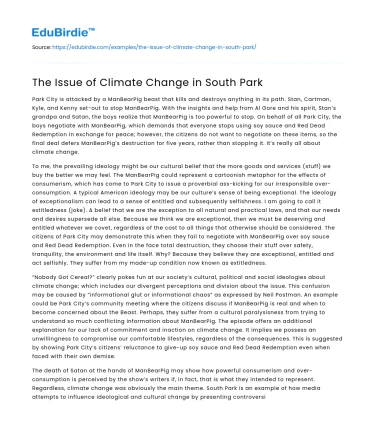Park City is attacked by a ManBearPig beast that kills and destroys anything in its path. Stan, Cartman, Kyle, and Kenny set-out to stop ManBearPig. With the insights and help from Al Gore and his spirit, Stan’s grandpa and Satan, the boys realize that ManBearPig is too powerful to stop. On behalf of all Park City, the boys negotiate with ManBearPig, which demands that everyone stops using soy sauce and Red Dead Redemption in exchange for peace; however, the citizens do not want to negotiate on these items, so the final deal defers ManBearPig’s destruction for five years, rather than stopping it. It’s really all about climate change.
To me, the prevailing ideology might be our cultural belief that the more goods and services (stuff) we buy the better we may feel. The ManBearPig could represent a cartoonish metaphor for the effects of consumerism, which has come to Park City to issue a proverbial ass-kicking for our irresponsible over-consumption. A typical American ideology may be our culture’s sense of being exceptional. The ideology of exceptionalism can lead to a sense of entitled and subsequently selfishness. I am going to call it extitledness (joke). A belief that we are the exception to all natural and practical laws, and that our needs and desires supersede all else. Because we think we are exceptional, then we must be deserving and entitled whatever we covet, regardless of the cost to all things that otherwise should be considered. The citizens of Park City may demonstrate this when they fail to negotiate with ManBearPig over soy sauce and Red Dead Redemption. Even in the face total destruction, they choose their stuff over safety, tranquility, the environment and life itself. Why? Because they believe they are exceptional, entitled and act selfishly. They suffer from my made-up condition now known as extitledness.
Save your time!
We can take care of your essay
- Proper editing and formatting
- Free revision, title page, and bibliography
- Flexible prices and money-back guarantee
“Nobody Got Cereal?” clearly pokes fun at our society’s cultural, political and social ideologies about climate change; which includes our divergent perceptions and division about the issue. This confusion may be caused by “informational glut or informational chaos” as expressed by Neil Postman. An example could be Park City’s community meeting where the citizens discuss if ManBearPig is real and when to become concerned about the Beast. Perhaps, they suffer from a cultural paralysisness from trying to understand so much conflicting information about ManBearPig. The episode offers an additional explanation for our lack of commitment and inaction on climate change. It implies we possess an unwillingness to compromise our comfortable lifestyles, regardless of the consequences. This is suggested by showing Park City’s citizens’ reluctance to give-up soy sauce and Red Dead Redemption even when faced with their own demise.
The death of Satan at the hands of ManBearPig may show how powerful consumerism and over-consumption is perceived by the show’s writers if, in fact, that is what they intended to represent. Regardless, climate change was obviously the main theme. South Park is an example of how media attempts to influence ideological and cultural change by presenting controversial political, social and cultural issues. South Park does it well by cloaking them in humor and delivering it in an animated weekly dosage. I think this particular episode reflects many of our current cultural attitudes and their effects on our choices and actions. Nevertheless, “Nobody Got Cereal?” made me laugh and feel bad at the same time. Much like I feel when I pretend to catch a spider and chase my girlfriend around the house. I laugh, but I feel bad for doing it.






 Stuck on your essay?
Stuck on your essay?

